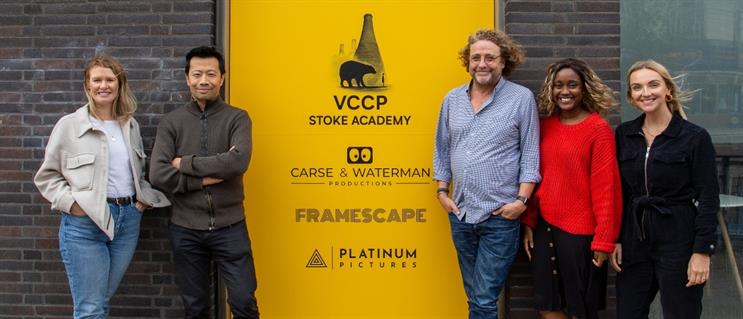“London is the barrier, it’s that simple,” says Jim Thornton, executive creative director at VCCP.
Thornton is referring back to a conversation he had six years ago with Michael Lee, VCCP’s chief strategy director, in which they tried to figure out why their talent pool was repeatedly shrinking. It was – and is – an “exception” to hear a regional accent in the creative department, he adds, and the issue broadly sprouts from socio-economic inequality.
The pandemic only served to highlight and intensify the issue. Senior brand planner Luke Alexander-Grose says VCCP used to crack open the door and have people fighting for the chance to work for them, but now it is more akin to a “barren wasteland”. He says: “We realised that we can't wait for talent to come to us, we have to go to it.”
Enter Stoke-on-Trent. Hometown of Robbie Williams, neighbour to Staffordshire’s Alton Towers, and keeper of multiple stately gardens. More importantly, the city is also the “birthplace of Britain’s creative industries'', says Alexander-Grose. Josiah Wedgewood, born in Burselm, founded the pottery manufacturer Wedgwood in 1759, and pioneered the mass production of pottery in Europe.
A pretty picture, but the realities of Stoke-on-Trent are much bleaker. Recent analysis by the Joseph Rowntree Foundation revealed that with children in constituency Stoke-on-Trent Central receive Universal Credit or working tax credits, while, on average, 39% of families in Britain receive the same benefits.
Which brings VCCP to its current endeavour. Thornton and Alexander-Grose highlight Leeds and Manchester as the go-to hubs outside London, but working-class cities like Stoke-on-Trent are being frequently ignored.
Perversely, it was the pandemic that allowed the team to start making a positive difference. Thornton, Lee and co ran a pilot scheme with five students in addition to their day jobs. By summer, they were running a work experience scheme with 40 students from Stoke Sixth Form College.
Thornton says: “The first thing that we were met with was disbelief by the students that we would be interested in them, they assumed we would just be doing a tick-box exercise. I mean, literally, that was their attitude. Then we proved that we weren’t, as people like Luke [Alexander-Grose] put a lot of effort in.”
Naomi Baxter, course leader at the college, says: “The VCCP Student Challenge enabled students to work collaboratively in researching, developing and creating an advertisement for a live brief. The VCCP team challenged them to think bigger and aim higher with their work. The experience really helped widen their industry awareness and inspire their future career ambitions.”
Thornton adds that such was the raw talent on the work experience scheme, that if “circumstances were right”, at least five students would have been offered apprenticeships.
But the infrastructure wasn’t in place at the time, and without a long-term plan, the effort will amount to little more than a tick-box exercise. Studies show that trainees from marginalised backgrounds have a than their peers. So, to make an active difference in the industry, there must be a sustained plan and effort to retain staff from lower socio-economic backgrounds and those outside of London.
Alexander-Grose is a graduate of VCCP’s old graduate scheme himself and speaks of the difficulty of retaining graduates who grew up outside of London. “You're asking people to up their lives, move here, and go into shared accommodations in places they don't necessarily know.”
“Why should everyone have to pick up their lives and come here to a busy city?”
The plan to bring the work to the people is still uncertain. Thornton says: “No-one has done anything like this before. And so we're kind of making it up as we go along. But ultimately what we'd love to do is create a model that you can actually roll out in Blackpool or you could roll out in Cardiff.”
More immediately, the team are planning to create over 500 opportunities over the next year by connecting with three local sixth form colleges, Staffordshire University and Keele University. They are hoping to establish their apprenticeship scheme within the next six months.
Currently sharing office space with local VFX company Carse and Waterman, VCCP is eventually aiming for a permanent office space in Stoke, recruits from early-career schemes, local staff, and local clients.
Thornton adds: “The long-term aim is to create an agency. Because the whole point of this is that people shouldn't have to leave to be able to work for us any more."
Thornton finishes off by saying: “I don't really care if some of these kids end up working for Creature or Mother or McCann's, or wherever.”
Words he may come to regret saying if the talent for advertising outside of London is as available as he says it is. For him and the VCCP team, it seems the most important thing is that the industry moves on from the polished graduates which have come to make up their own offices.
Image from left to right: Lynsey Monroe, Michael Lee, Jim Thornton, Kenny Dada, Gemma Smyth.


